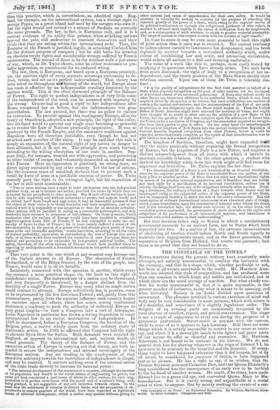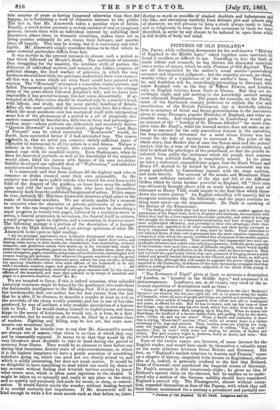THE CONSTABLE OF THE TOWER.* NOVEL-WEITERS during the present century
have constantly made attempts, not entirely unsuccessful, to combine the historical with the amusing; and that in a shape which, whether profitable or not, has been at all events acceptable to the world. Mr. Harrison Ains- worth has adopted this style of composition, and has produced more than one romance in which kings and nobles are introduced, and in which there are the usual average of murders. But what chiefly ren- ders his works unsuccessful is, that it is quite impossible, in the greater number of instances, to say what is meant to be amusing, and what historical. Society is no doubt divided upon questions of amusement. The pleasure involved in various exercises of mind and body may be very considerable to some persons, which with others is of a doubtful, and sometimes of a slightly lugubrious order. The delights of an evening party are occasionally tempered by the total absence of comfort, repose, and genial conversation. The stage is not a temple of enjoyment to every one during the progress of & gymnastic pantomime. Street-music is popular with the masses, while to some of us it appears to lack harmony. Still there are some things which it is utterly impossible to receive in any sense as amus- ing, and which it is a downright insult to the lighter and gayer parts of our nature th offer as cheerful and recreative. Mr. Harrison Ainsworth is not bound to be accurate in his history. We do not quarrel with him for altering whatever in the reign of Edward VI. he perceives to be contrary to the beautiful and the dramatic. If every- thing ought to have happened otherwise than it did happen, let it by all means be considered, for purposes of fiction, to have happened just as he pleases. He has a right to say, if he wishes, that Sir Thomas Seymour poisoned Catherine Parr, and that Queen Elizabeth's long maidenhood was the consequence of an early vow to be faithful to the husband of another woman. He might, if he chose, have made Edward live to a green old age, and converted Queen Mary to Ma- homedanism. But it is purely wrong, and unjustifiable in a social point of view, to suppose that by merely reciting the events of a oar-
We are tempted to fancy, if this is indeed amusing, what splendid historical romances might be framed by the gentlemen who contribute the fashionable intelligence to the Morning Post. If it is not amusing, but irredeemably dull, our author has the less excuse from the fact that he is able, if he chooses, to describe a murder at least as well as the novelists of the cheap weekly journals, and has in one of his tales produced, by way of incident, a very readable description of a famous ride to York. If he would confine himself to highwaymen, and leave kings to the mercy of historians, he would not, it is true, be a first- rate novelist, but he would, at all events, be liked by a certain class of readers. Fighting and killing may be low art, but state cere- monies are monotony itself.
It would not be strictly true to say that Mr. Ainsworth's novels are always out of season—that there is no time at which they may not be reasonably enjoyed. It seems to us that they would be the very literature most desirable to take in hand during the period of recovery from illness. They would be so pleasant to have before one during that luxurious dreamy state of semi-convalescence, in which it is the highest happiness to have a gentle sensation of something indefinite going on, which one need not too closely attend to, and which is mildly interesting, but does not much matter. It would be so delightful to have something to read which one could lay down at any moment without feeling that feverish restless anxiety to know what conies next, which is often most injurious to the invalid. It might be taken up so naturally and easily at any place in the story, and so quietly and painlessly laid aside for meals, or sleep, or conver- sation. It would faintly excite the wonder, without leading beyond it to morbid curiosity and impatience. If Mr. Ainsworth will be kind enough to write a few more novels such as that before us, intro-
tan number of years as having happened otherwise than they did happen, he is furnishing a work of romantic interest to the public. The fact is, that Mr. Ainsworth takes a peculiar view of fiction. Usually, a novel-writer presents a certain number of real or imaginary persons, invests them with an individual interest by unfolding their characters, places them in dramatic situations, makes them act as living persons ordinarily do act, traces their fortunes, and marries them off happily. This may be wrong, but it is customary and intel- ligible. Mr. Ainsworth simply considers fiction to be that which in some material particulars differs from fact. It was unwise in the present instance to choose such a period as that which followed on Henry's death. The multitude of interests then struggling for the mastery, the intricate strife of parties, the delicacies of individual motives and tempers, the hidden progress of political change, the loud warfare of polemics, in which the very loudness showed how little the partisans understood their own cause— all this was a scene which not even Scott could have painted with success. The "Henriade" attempted a somewhat similar picture, and failed. The nearest parallel to it is perhaps to be found in the strange story of the years which followed Athaliah's fall ; and we know how impossible it has proved to image this last scene dramatically. If at- tempted at all, these crises should be touched only by a master's hand, with labour, and study, and the most careful handling of details. After all, the most successful of historical novels have been those in which the most assiduous care has contented itself with interpreting some few of the phenomena of a period in a set of imaginary cha- racters connected by fanciful ties, with two or three real personages— seldom more—whose portraits are elaborately and accurately drawn. "Quentin Durward" is a successful novel ; perhaps the "Last Days of Pompeii" may be called successful. "Kenilworth" would, no doubt, have succeeded better if it had attempted less. The reason eigdently is, that no artist can conceive clearly sufficient types of character to correspond to all the actors in a real drama. Nature is infinite in its forms; the writer, who creates every scene afresh, cannot cope with its manifold variety. Even Shakspeare, when he drew his historical portraits as well as his knowledge of the originals would allow, filled his canvas with figures of his own invention. Schiller developed one splendid ideal of "Wallenstein," and added his countesses and heroines from fancy. It is commonly said that those authors fill the highest rank who in romance or drama conceal most their own personality. As the sculptor was held up to public rebuke who traced his own form in the folds of the drapery of the goddess, so those have sung the noblest epics and told the most thrilling tales who have kept themselves reverently back from the published foreground of action. If this canon be true, certainly Mr. Harrison Ainsworth deserves a high place in the ranks of historical novelists. We are utterly unable for a moment to conceive what the character or private sentiments of an author must be who can imagine that he pleases his readers by describing a royal progress in twenty-two pages, followed by a reception-scene in seven, a funeral procession in seventeen, the funeral itself in sixteen, a royaless again in eighteen, and a coronation in fourteen more.
The following is a portion of the description of a banquet given by the High Admiral, and is an average specimen of what Mr. Ainsworth looks upon as light reading :
"All the principal apartments were brilliantly illuminated with wax tapers. Attired in doublets of crimson velvet, with chains of gold round their necks, and bearing white staves in their hands, the chamberlain, vice-chamberlain, steward, treasurer, and gentlemen ushers were drawn up in the entrance-hall, ready to receive the various important gusts on their arrival. Besides these, there was a crowd of esquires, pages, marshals, and grooms, all in rich liveries, intermingled with yeomen bearing gilt poleaxes. But wherever the guests wandered—up the grand staircase with its elaborately sculptured posts, adown the long corridor, through the spacious chambers—there were other officers of the household to be met with—marshals, esquires, pages, and grooms, as at Whitehall All the guests were ceremoniously received in the great entrance. hall. by the various officers of the household, and were then ushered on by troops of marshals and pages to a presence-chamber, where" &c. &c.
ducing as much as possible of slashed doublets and habergeons and the like, and abstaining carefully from delicate plot and minute play of character, we will promise to keep a stock always ready to hand and so religiously to keep them for such occasions as those we have described, as never by any chance to be induced to open them while in full health of body and mind.































 Previous page
Previous page